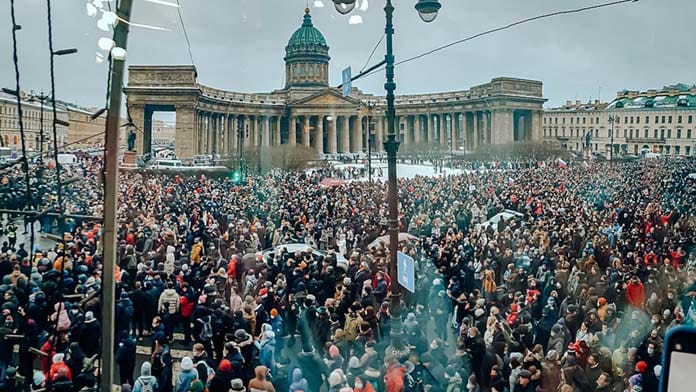Protests erupted across almost 200 Russian cities in late January. Tens of thousands of people have taken to the streets demanding the release of Alexei Navalny, a key opposition leader. The protesters also demanded the release of other political prisoners, called out Russian President Vladimir Putin’s corruption, and stood in solidarity with the protesters in Belarus.
A second round of protests took place on 31 January. The government closed down central streets, limited and detoured public transport, suppressed mobile reception and arrested over 9000 people in two days. Rallies in solidarity with the Russian protesters were also held across Australia, organised by the Russian community. Over 60 people protested in Sydney, and around 40 in Melbourne and Adelaide, with smaller actions also being held in Brisbane and Perth.
Navalny was immediately arrested on his return to Russia on 17 January. Fearing protests, the government went as far as closing down one of the biggest international airports in Russia, forcing Navalny’s plane to detour to another airport.
State officials have always tried to dismiss his political significance, with Putin never using Navalny’s actual name, calling him the “Berlin patient” or “that blogger” instead. The drastic actions taken on the day of his arrival, however, showed otherwise, and only further increased his popularity.
In August 2020, Navalny was poisoned with Novichok, a prohibited chemical weapon produced in Russia. He survived and was taken to Berlin for recovery. Later on, Navalny, together with investigative journalism outfit Bellingcat, released evidence of involvement by Russia’s main security agency, even naming specific agents involved in his attempted murder.
But Navalny is not the alternative to Putin that is needed. On his website, Navalny, a nationalist and neo-liberal, calls for deregulating the economy and introducing visas for migration from former Soviet countries in Central Asia, while at the same time simplifying the migration process for what he calls “developed countries”.
Navalny’s arrest, however, was a spark for people who are tired of corruption, worsening living conditions, and Putin’s authoritarian rule, to speak out and stand up for their rights. During the COVID-19 crisis in 2020, those in poverty rose to 13.5 per cent of the population, or almost 20 million people. People’s income fell by 8 per cent in one year, a record since the economic instability of 1999.
Corruption heavily affects all levels of government, with Putin directly implicated. Right after Navalny’s arrest, his team released an investigation into the palace Putin is building for himself. The palace’s territory is 39 times bigger than the city-state of Monaco. Close to US$1.4 billion has allegedly been spent on the residence so far. The video investigation has reached 100 million views and is currently the most watched video on Russian YouTube.
Although most Russians are quite aware of corruption, this evidence of the incredible scale of it has further motivated people to protest.
Authoritarianism
Putin has tried to crush the wave of protests with a mixture of repression and fear. Thousands of protesters have been arrested, opposition activists have had their houses searched, with some being charged or placed under house arrest.
Riot cops have been out in full force, with thousands of them blocking the streets, beating up protesters and arresting people at random from the crowd. Putin has been learning from the protests that began last year in Belarus, with many tactics being tried out there first. In one region, plain-clothed riot police dressed in balaclavas. Police also grabbed people out of their cars for honking in support or trying to escape police brutality via taxi, as in Belarus.
“Across the country up to 10,000 people were detained over two weeks of protest”, according to the Russian group, Socialist Tendency, who reported that, “many left movements, including our own group… agreed on the need to go to these events to agitate.”
Pro-government sources released a video of one of the arrested opposition figures asking people to stop protesting. It was clear that it was made under threats.
There are currently at least another 66 people in Russia in jail for political reasons. The high profile “network” case resulted in ten people being jailed last year for between three and a half and 18 years. They were a group of friends who played airsoft games and discussed left-wing politics, but were accused of plotting terrorist attacks. They were convicted based on “confessions” made under torture and abuse.
Azat Miftakhov, a mathematician with anarchist views, was sentenced to six years in jail in January after being accused of attacking the ruling party’s offices. The only evidence against him was the testimony of two “secret witnesses”, including one the prosecution claimed had died before the trial. The “Moscow” case saw another 24 people charged for “mass rioting and assaulting the police” during the peaceful protests of 2019. Footage of the protests, however, clearly shows cops beating up people and breaking up peaceful marches. Some of those jailed over the case were released after a massive public backlash.
On 2 February, Navalny was tried and sentenced to two and a half years in jail. The protests that erupted on that day led to 1400 people being arrested.
The Russian opposition, however, needs to broaden its focus. There are large sections of the population who are not interested in Navalny or political prisoners in general, but are, for example, significantly affected by the recently raised retirement age. Much of the popular opposition still fails to reach out to the working class, the same mistake that was made by the opposition in Belarus last year. Offering workers a real alternative by fighting privatisation, demanding liveable wages and social support, would give the opposition a much higher chance of getting rid of Putin’s authoritarian regime.
By Pavel Gimov






